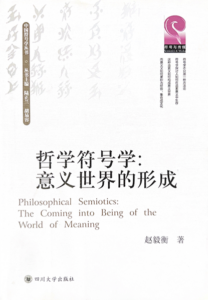
Zhao Yiheng 赵毅衡
Sichuan University Press, 2017
Reviewed by Chen Xue
In Yiheng Zhao’s Philosophical Semiotics: The Coming into Being of the World of Meaning, the author attempts to solve the question of whether semiotics is a methodology as is generally held, and if the studies of meaning and the mind can shed light on a series of metaphysical issues, the edifice of semiotics could be erected on the philosophical ground. It proposes that philosophical semiotics is, by necessity, a semiotic phenomenology about the construction of the “world of meaning” by signs, and any discussion about semiotics shall proceed around two core issues: meaning and the mind.
The basic definition of meaning in this book is the way of association that enables the formation of consciousness and object respectively. The meaning is given by the interpreter, as an intentional activity of the subject. Therefore, the meaning depends on interpretation, and the encounter between the subject’s consciousness and the object is the source of meaning formation. The connection between subject and object is a two-way interaction process, meaning is the association of subject and object, and the definition of meaning is also a two-way composition, meaning is determined by the subject’s interpretation and communicated through signs. Accordingly, the subject exists in the interpretation of the meaning and these signs. The focus of Zhao Yiheng’s definition of meaning in his book is not the essence of meaning, but the process of meaning production, i.e., the inner relationship between consciousness, objects, and signs.
For decades, Professor Zhao has devoted himself to the study of meaning. In this breakthrough text, he builds a theoretical framework of meaning production, experience, and socialization along the path of meaning formation, which provides a feasible methodology for understanding and interpreting the meaning. In addition, in the chapter “Truth and Community,” the author leads an exploration of community truth based on various discussions on previous works of truth, including the theory of correspondence, the theory of consensus, etc., which provide us with criteria for defining “what is truth.”
